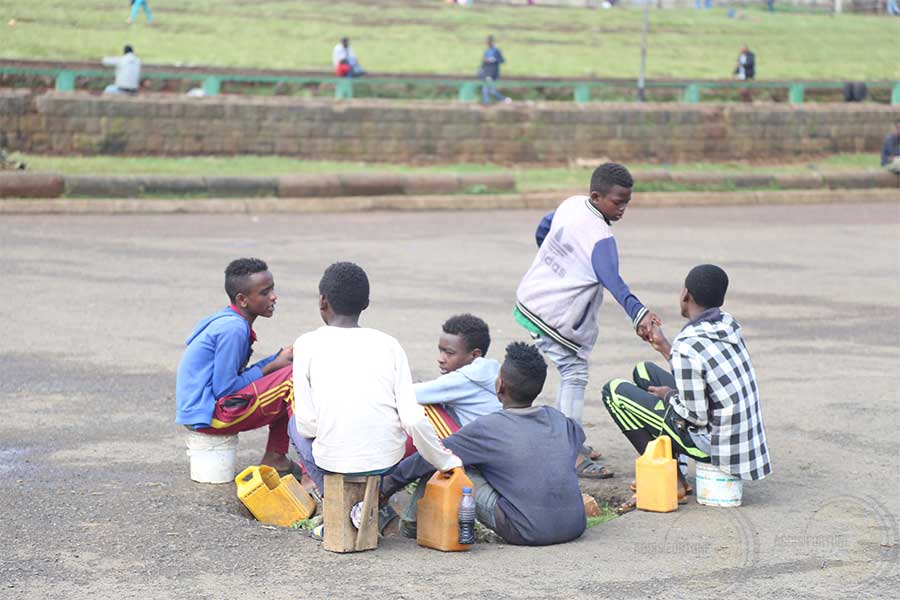
Viewpoints | Jul 07,2024
Mar 21 , 2020
By Kidist Yidnekachew
Fact-checking has never been my strong suit. My trusting nature and rainbow and butterfly outlook on life has made me complacent in this area. But with current advancements in technology and humankind’s ever unquenchable thirst for fiction, I have recently concluded that this may not be a great idea.
It is not uncommon to hear people make incorrect statements, half-truths, misleading or misinterpreted information, or, in some cases, pure nonsense. Several years ago, a less cynical me would have attempted to inform such people that their statements are clearly incorrect. But after years of receiving confrontational responses from people, I have stopped for fear of wasting my time. Still, overhearing these statements is nonetheless annoying.
A couple of weeks ago, I noticed that my kitchen was getting infested with cockroaches. Having dealt with this issue in previous houses I have lived in and reading about the life cycles of these detestable insects, I was not unfamiliar with the problem.
However, I was exposed to a common misconception when I raised the issue of my infestation with a neighbor. This was right after I told him I was going to use an insecticide.
"That won't work, because it doesn't kill the eggs that hatch from inside the dead roach bodies," he replied.
It was a common and bizarre statement I have encountered at various times. It is simply not true that the eggs inside adult roaches survive even after the female has died and their bodies lie decomposing in the crooks-and-nannies of our houses.
I remembered hearing an even more bizzare assertion a few days ago. I was walking, and it began to drizzle. I had no umbrella, thus someone told me to at least put one of those thin plastic bags on my head so I do not contract lice from the rain. This is one of the old misconceptions. Of course, this is simply not true. Raindrops do not contain lice larvae. There is no scientific basis for such a claim.
The misconceptions are likely to increase following an outbreak such as Novel Coronavirus. We are being exposed to misinformation already. A post on Facebook recently went viral - and was inboxed to me more than 20 times by different individuals - that alleged that the Ministry of Health had advised that the Novel Coronavirus could be prevented by drinking 20ml of warm water.
Ministry of Health of where? What kind of pseudoscience says viral infections use dry spots to enter the body and not viral nodes? Am I the only one who took eighth-grade biology? Am I wrong?
It did not take much research to find out that this was, of course, false.
Another viral post alleged that the Novel Coronavirus is vulnerable to alcohol and that drinking local gin can kill it. This is despite the fact that alcohol consumption suppresses the immune system.
There is no surprise that misinformation and superstitions spread throughout society. Mostly, we have wrong understandings about facts that are inconsequential. But sometimes our view of our own history and outlook on politics and outsiders is detrimental. This is not to mention the importance of using our reason and logic in testing times such as these.
To a certain extent, this comes from the way we negatively view criticism in our culture. We can see the manifestations of this perfectly well on social media. Some individual on Twitter or Facebook becomes popular by echoing society's grievances. Within a short period, that person becomes revered and irreproachable. At this point, trying to say anything against a misconception they are propagating is comparable to blasphemy.
This should not be the case though. We should take issue with blindly following individuals merely because they have a higher number of followers. We should not be so closed-minded that we fail to question what these individuals say and ask for proof.
We have the responsibility to do our own research and examine the merits of what we have heard. Not all information is correct, and our feelings toward the individual dispensing information should not cloud our judgment in weighing the merits of their statements.
In these trying times of global misinformation, we should all verify any information that we hear that affects our perception of our country, the world we live in, or that alters our outlook in any way, shape or form.
PUBLISHED ON
Mar 21,2020 [ VOL
20 , NO
1038]


Viewpoints | Jul 07,2024

Films Review | Apr 17,2020

Commentaries | Aug 13,2022

Viewpoints | Nov 02,2019

Commentaries | Oct 31,2020

Radar | Sep 08,2019

Editorial | Apr 09,2022

Commentaries | Nov 21,2020

Verbatim | Jul 07,2024

Films Review | Oct 09,2021

Photo Gallery | 179327 Views | May 06,2019

Photo Gallery | 169524 Views | Apr 26,2019

Photo Gallery | 160434 Views | Oct 06,2021

My Opinion | 137171 Views | Aug 14,2021
Commentaries | Oct 25,2025

Dec 22 , 2024 . By TIZITA SHEWAFERAW
Charged with transforming colossal state-owned enterprises into modern and competitiv...

Aug 18 , 2024 . By AKSAH ITALO
Although predictable Yonas Zerihun's job in the ride-hailing service is not immune to...

Jul 28 , 2024 . By TIZITA SHEWAFERAW
Unhabitual, perhaps too many, Samuel Gebreyohannes, 38, used to occasionally enjoy a couple of beers at breakfast. However, he recently swit...

Jul 13 , 2024 . By AKSAH ITALO
Investors who rely on tractors, trucks, and field vehicles for commuting, transporting commodities, and f...

Oct 25 , 2025
The regulatory machinery is on overdrive. In only two years, no fewer than 35 new pro...

Oct 18 , 2025
The political establishment, notably the ruling party and its top brass, has become p...

Oct 11 , 2025
Ladislas Farago, a roving Associated Press (AP) correspondent, arrived in Ethiopia in...

Oct 4 , 2025
Eyob Tekalegn (PhD) had been in the Governor's chair for only weeks when, on Septembe...

Oct 25 , 2025 . By YITBAREK GETACHEW
Officials of the Addis Abeba's Education Bureau have embarked on an ambitious experim...

Oct 26 , 2025 . By YITBAREK GETACHEW
The federal government is making a landmark shift in its investment incentive regime...

Oct 29 , 2025 . By NAHOM AYELE
The National Bank of Ethiopia (NBE) is preparing to issue a directive that will funda...

Oct 26 , 2025 . By SURAFEL MULUGETA
A community of booksellers shadowing the Ethiopian National Theatre has been jolted b...